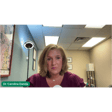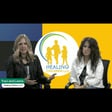Become a Creator today!Start creating today - Share your story with the world!
Start for free
00:00:00
00:00:01

Season Two/Episode Twelve: Double Hormones, Double Hope - Perimenopause and Puberty Under one Roof
When your teenager is battling acne and mood swings while you're dealing with hot flashes and brain fog, it might feel like your house is under hormonal siege. But what if this challenging time could actually become your family's greatest opportunity for connection and health advocacy?
Dr. Amy Beckley, PhD and founder of Proov, shares how mothers navigating perimenopause can use their own hormone journey - backed by real data from at-home testing - to model informed health advocacy for their teenagers going through puberty.
Transcript
Introduction to Guardians of Hope Podcast
00:00:00
Speaker
Welcome to the Guardians of Hope podcast, where we bring together parents, nonprofits, legal and medical experts dedicated to positively impacting children's lives. I'm your host, Cynthia Ramsaran. The thoughts and opinions of my guests are not necessarily my own.
00:00:15
Speaker
So thank you all for joining and sharing. Okay, welcome
Navigating Puberty and Perimenopause: A Family Challenge
00:00:19
Speaker
everyone. Today we are tackling one of the most challenging yet common scenarios many families face, navigating puberty and perimenopause under the same roof.
00:00:30
Speaker
Picture this, you're dealing with your own hormonal roller coaster, hot flash hot flashes, irregular periods, mood swings, and brain fog, while sam simultaneously trying to support your teenager through their own hormonal upheaval.
00:00:47
Speaker
You're both experiencing dramatic changes in your bodies, but neither of you has clear answers you need to understand what's happening or how to advocate for proper care.
Expert Insights from Dr. Amy Beckley on Hormonal Changes
00:00:58
Speaker
Our guest today, Dr. Amy Beckley, founder of Prove, understands the struggle intimately. After facing her own fertility and hormone challenges, she created the first FDA-cleared at-home test to confirm ovulation.
00:01:14
Speaker
But her mission has expanded far beyond fertility. PROVE now offers comprehensive hormone testing that can help both perimenopausal women and their families understand what's happening in their bodies.
00:01:28
Speaker
Welcome, Dr. Beckley. Thank you so much for joining us. Thank you so much for having me. Excited to be here. Of course, me too. So let's start with the reality that many of our listeners are going through.
00:01:40
Speaker
Mom is going through perimenopause while her teenager is navigating puberty. Both are dealing with hormonal chaos, but often in isolation. How can families approach this as a shared experience rather than two struggles?
00:01:57
Speaker
I mean, I think it's important to know that you're on the, both the bookends. So, you know, you have ovulation, you have menstruation, you have a cycle. It's your ovaries have a job and they start at puberty, then they end at menopause.
00:02:11
Speaker
And so you have one individual that's starting her ovarian function journey. And then another individual who is ending her ovarian function journey. And so I think if we could just say, you know what, it's the same thing that we're going through. It's the same hormones.
00:02:26
Speaker
I think it helps kind of normalize it and help say, you know what, I'm going through the same thing. It's not as different as we think it is. This is definitely how it approach it.
The Importance of Hormone Data in Healthcare Advocacy
00:02:36
Speaker
yeah Okay, great. Well, thank you for sharing that. Now you created tools that give women concrete data about their hormones. Why is having this information so crucial for advocating with healthcare care providers? I know I'm going through the same thing currently and it can be frustrating. So what happens, um,
00:02:57
Speaker
if you don't have the information um and you don't have the education about your hormones, that's the first question for you. And it's a series of others. Yeah.
00:03:08
Speaker
I mean, let's start about, um you know, like a car mechanic. You know, we always think like women going to a car mechanic, they're always going to sell us more stuff than we need because we just don't know anything about cars. And so if you so hey, it's making this noise or it won't go and you go to the car mechanic, you're relying on the person behind the counter to tell you what's wrong and you know, they could be selling you stuff that you don't actually need.
00:03:33
Speaker
And maybe they think that they're doing you a service by saying, oh, you have this dirty air filter, you know, you got to clean it up. It's healthy. oh your tires need to be rotated. um and they're trying to help you.
00:03:45
Speaker
um but when you have a better knowledge of who you are and your hormones and things going in your body, You get to help guide that conversation. and so instead of just going and saying, I just don't feel like myself, or I just feel off, what is it? It's just so many different possibilities. It's hard to get at a really good resolution as opposed to, you know what, I've been feeling a certain way. Um, maybe I you know put my symptoms into chat GPT or I Googled, or I had a friend that said this.
00:04:16
Speaker
And they told me that, Hey, it could be, you know, my progesterone is low. Like, you know, what is progesterone? And what do you you think it could be my case? Um, and so it just gives you kind of like, um, a way to have a better conversation. So you can kind of see a little bit more eye to eye and have ownership in your journey.
Educating the Next Generation about Hormones
00:04:34
Speaker
And so I think if you don't come in with that knowledge, you're just relying on somebody else, which is scary. because when you rely on somebody else who hasn't had your life experiences, they don't have the complete story.
00:04:47
Speaker
And so it can be really, really difficult to find a good solution an efficient pace. Absolutely. So having going to the doctor and being armed with this knowledge obviously gives us ah the upper hand are, you know, as advocates for ourselves, right?
00:05:07
Speaker
Now, how do we share this with our children? How do we share this knowledge and experience with our kids who are going through similar feelings and changes?
00:05:19
Speaker
Yeah, I mean, um so my daughter is 11. um She actually might make an appearance because she's here. and she has just had her second period um of her life.
00:05:30
Speaker
And take it as an opportunity to educate. And, you know, it's not it something she's going to have to live with. um I mean, she was like, I don't want to go swimming because I don't know to while I'm on my period.
00:05:43
Speaker
So I don't want to have her have that burden on her for entire life and question things. So I like to be very open. And, you know, you could use this thing called a tampon. and She's like, well, what is that? And I'm like, okay, it's this, it goes internal and you have to put it in this way, not this way. and she's like, yeah, not for me yet.
00:06:01
Speaker
and We talk about, you know, there's going to be secretions coming from your body. Some of them are normal and some of them are not. Here's when you should talk to somebody if it if it looks like this or smells like this.
00:06:13
Speaker
um But during the normal process of making hormones and ovulation, you're going to have certain things. it kind of looks like like egg whites and she's like, ew. And I'm like, it is what it is. It's something you have to live with.
00:06:25
Speaker
um And so I think it's just really important that you give her that foundational um knowledge because she's going to have to live with this her entire, you know, the 30, 40 years, 40 years about.
00:06:41
Speaker
Yeah. um And so, you know, it's a ah good, third fourth or fifth of her life is going to be on her period. So she's going to have to learn. And I would rather her do that and feel confident that she can speak to her friends and and other people as opposed to feeling like she's isolated and alone.
Managing Symptoms of Perimenopause and Puberty
00:07:01
Speaker
Right. Yeah, absolutely. it's It's great. it's It's that being educated and knowing what's happening with your body is that you know the best way to live because then you know what's happening. You can talk about it with your friends.
00:07:16
Speaker
Like you said, she can educate her friends at school who may be shy to ask these questions. So, um, this is wonderful. And you talked about some of the things that, you know, your daughter or anyone going through any bodily changes due to hormones should look out for.
00:07:33
Speaker
what are some of the key things that a perimenopausal woman should be tracking and a teenager, I guess, at the same time when it comes to hormones? Um, yeah, yeah. So we'll talk about the perimenopause first.
00:07:47
Speaker
Um, a lot of women have a um, incorrect ah education that menopause happens at 50 or 55 it's when you don't have any more periods.
00:08:02
Speaker
um I mean, that's technically true. The definition of of menopause is 12 months without a period. mean, it typically the age is 51, but what people don't realize is that there's this perimenopause transition that can happen right but probably around 40 on average, as early as 35, late as about 48.
00:08:23
Speaker
But in this time period, it's not like you have ovarian function, you're making hormones and then all of a sudden one day it just stops. it's a gradual decline of these hormones that have different symptoms.
00:08:35
Speaker
And so a lot of the times the symptoms that perimenopausal women are experiencing, they don't equate to perimenopause. And so they don't know what to ask. They don't know what to do.
00:08:47
Speaker
Physicians are trained that I'm not going to give hormone replacement until you haven't had a period for 12 months. So it's it's really just a struggle. um And so when you're in your forties, late thirties, early forties, you know, the things that you should look for are brain fog.
00:09:03
Speaker
um And it's not just for getting keys. It's, I was in the middle of a sentence, a middle of a thought, and I just forgot what I was going to say. Or like, I just, I i slipped. i I can't say the words that are coming out of my mouth because I want to say couch, but I can't like say the word couch. Like that's brain fog.
00:09:21
Speaker
um That's ah one of the first signs of perimenopause. um closer together periods. So if you've had 28 day cycles, now you're having 25, 24 day cycles.
00:09:32
Speaker
That's a sign of perimenopause heavier periods. So, you know, just more bleeding. That's another sign. um Sleep issues. So either trouble sleeping or a very very classic one is waking up at about 3 a.m. m and not knowing why. hmm.
00:09:50
Speaker
um These are all the early, early symptoms of perimenopause. So there's two main hormones, estrogen and progesterone. People think it's all an estrogen because it's like, oh, hormonal placement, estrogen, estrogen, estrogen.
00:10:03
Speaker
All the symptoms I just described are progesterone because that's the hormone that goes first. And then when estrogen goes, that's your hot flashes, your night sweats, osteoporosis risk, those types of things.
00:10:18
Speaker
no And so, you know, when you're getting those initial signs, you should be seeking care and in a uninformed, um we just don't know enough about perimenopause.
00:10:29
Speaker
It's not the doctor's fault. It's nobody's fault. It's we just don't know enough. And women don't know enough about their bodies to ask the right questions that, you know, what we can go in at 40 and say, I think I'm in perimenopause. I have these symptoms.
00:10:42
Speaker
um I don't think I need estrogen, but can I have progesterone only therapy or, um whatever that is, because a lot of times, like oh, the other big one is anxiety and depression.
00:10:54
Speaker
They'll get put on anxiety medications when they should have been put on hormones. they should The real thing that you're supposed to be treating is this hormonal decline, perimenopause, that's causing brain changes.
00:11:07
Speaker
and instead you're getting on you know antidepressants, anti-anxiety medications, which isn't going to solve the other symptoms that you have going on.
Recognizing Abnormal Hormonal Symptoms
00:11:17
Speaker
Yeah. All right. So we went through perimenopause, but what about the puberty portion of that ah question?
00:11:25
Speaker
Yes. so So puberty, I'm going to focus on the things that that girls care about the most, um face facial acne um and bloating. And so typically a few weeks before a period, a teenager will break out and that's because of the hormonal changes that they're seeing.
00:11:45
Speaker
And so I remember my daughter just got um acne on her forehead and she's like, mom, everything I do, I can't get rid of, I can't get rid of it i'm like, I think your period is going to come. And sure enough, a couple weeks later, her period came.
00:12:00
Speaker
um Another one is is bloating, right? so your ovary is small and then it makes an egg and it gets a little bit bigger. And so you can see like different kind of things are going on in your body that's never happened before. So they, you know, clothes just don't fit as well.
00:12:15
Speaker
Those are things that um they should look out for. and then on the emotional side is, you know, changing hormones is something that their little brains and their little bodies have never seen before. And it, they can get very, very emotional. You know, my daughter would just cry when my son looked at her, didn't say anything, just looked at her as like, oh my gosh.
00:12:41
Speaker
um And it's just, there they the brain the the hormones have receptors in your brain and your brain are seeing these things for the very first time and they just need to figure it out. you know It's like this transition period and it's not bad. it's It's something that we just need to get used to and and you know just saying, oh my gosh, like just stop doing that. Don't act that way and getting mad is not a good solution.
00:13:09
Speaker
A really good solution is tracking periods and tracking your mood. i have her tracking her temperature to help understand when she might get a period next. So she's kind of prepared.
00:13:20
Speaker
But studies have shown that if young girls are given tools to track their period, that they know that there's a certain five, seven day window that they're just gonna be an emotional wreck, but they know it's just five, seven days. And then when they get past it, they're good.
00:13:35
Speaker
and so they've had less suicidal tendencies, less depression, um you know and in a world where it's like, you're worried about what you look at you what you look like and you feel like all the boys know that you're on your period and you you know all these you know things kind of go through your mind.
Empowering Through Hormonal Education and Advocacy
00:13:52
Speaker
um So just letting know know it's it's normal, it's going to pass. um and Support them all the way. Right, its knowledge is power, 100%.
00:14:04
Speaker
ah we we're Just one more question for you about things to look out for and like um symptoms. So we talked about all the normal things. um What about some signs when um something is not right or that there needs to be some sort of medical attention versus normal hormonal fluctuation?
00:14:28
Speaker
Yeah, so things that are not right. So, um you know, young girls, i mean, all women that are ovulating produce cervical mucus. And so it is a you know secretion from the vagina and it's different throughout the cycle.
00:14:42
Speaker
And sometimes there's a lot mucus that is produced. And if the body is not used to that, it can cause a yeast infection and a a problem in the system because your body is just not used to having that wetness down there.
00:15:00
Speaker
um And so, you know, secretions that look like egg white, like, a like stretchy or creamy like lotion and just don't really have an odor. Those are totally fine, totally normal. That's what you're supposed to have.
00:15:14
Speaker
um But if it starts to look kind of like cottage cheese or it smells like fish, that's where you seek medical attention. That's probably an infection. The other one is trouble urinating or um inability to urinate, feeling like you have pee all the time and then like nothing comes out.
00:15:31
Speaker
Those are good signs of a ah UTI or urinary tract infection. And you don't want those to go too long because then it could cause kidney infection and something something kind of bigger.
00:15:42
Speaker
so I think it's important you know, that they know what's normal because it it wasn't normal last month when they didn't have their period, but it is normal now. And then when they should kind of seek care because you don't want them to feel um like they can't talk to you and just it gets worse.
00:16:01
Speaker
Yeah. Yeah. Absolutely. Thank you, Dr. Beckley. So I have one more question for you, and this may lead to another one. So forgive me. I'm just so curious about this topic. um Looking at the bigger picture, when we arm ourselves with knowledge about hormones and teach our kids to understand their bodies, how does this change the trajectory of healthcare advocacy for the next generation for our kids?
00:16:28
Speaker
I mean, it's got such a huge, profound impact. Um, I'm on the, but I think I'm a millennial. I might be Gen X, depending on what calendar you look at i was born in 1980 and I'm right at that cusp of, they just started giving everybody, um, birth control.
00:16:45
Speaker
um IUDs, hormonal birth control, you hit 16. Oh, you don't want to deal with hormone you know with heavy periods. You don't want to deal with the acne, the weight gain. like Everyone just gets the pill. Everyone gets the pill.
00:16:57
Speaker
um And i think it's got its place, right? well Nobody wants to have teen pregnancy, unwanted teen pregnancies. um But you also don't want to just mask your symptoms and forget about things. I ended up having um endometriosis and infertility later in life and hormone imbalances that I could have addressed when I was 16, when i was told, oh just you have heavy periods, you don't want to deal with these things, just go on birth control.
00:17:30
Speaker
That was my way of being like, hey, there's something wrong with you you. know, you could either address it or you can basically forget about it, mask it And that ended up, I ended up masking it. And then when I got married and came off pill 20 years later, tried to have kids, it's two rounds of IVF and $58,000 later, you know, it's, so I think, you know, it's always better to learn about your body and try to understand it than to ignore it or turn it off.
00:18:01
Speaker
because these are important things. I mean, we talked about when your body doesn't have these hormones, you feel anxious, you feel um depressed, you feel sometimes suicidal, like it has an impact on your brain.
00:18:16
Speaker
Think about you didn't have those hormones at all, like how is your brain rewired, right? So it's like not, ah it's not just your ovaries or uterus that have that need these hormones, it's every cell in your body, it's your heart, your bones, like everything.
00:18:33
Speaker
And so I'm not saying birth control is bad. and I'm just saying that you need to know, you know, just like you go to the store and you can turn the product over and you can look at the nutrition facts and you can say, this one's right for me or not.
00:18:44
Speaker
Imagine if you didn't have that ability and someone would just said, Nope, you have to eat this. I don't care. Just, just have to eat this. You want to have that education where you be like, yeah, that's actually not right for me and my body and my goals.
00:18:56
Speaker
I want to choose something else. So you have to educate yourself to know. that there are multiple options.
Introducing Prove: At-Home Hormone Testing
00:19:02
Speaker
Absolutely. So this leads us to um your Prove product.
00:19:08
Speaker
Tell us a little bit about how we can get it and how it works at home. um After talking to you and looking on your website, it's pretty easy and anyone can use it at home. So tell us a little bit about it.
00:19:22
Speaker
Yeah. Um, so I, I invented prove after dealt with infertility and told IVF was my only option. It turned out to be a very simple hormone imbalance. Um, so my almost 15 year old son is an IVF baby and my 11 year old that just had her second period is, um, just a hormone balancing, no advanced procedures needed.
00:19:44
Speaker
And that made me realize we didn't have access to our hormone information to be able to measure hormones at home. And so Prove is a system that works with urine. So you collect first morning urine, download the app. um The app guides you when to test and it's, you know, peanut cup, 10 minutes, scan it in and it reads your hormones and it builds a report for you depending on what kind of life stage you're at.
00:20:08
Speaker
So if it's fertility, we're going to help you understand your egg count, your full six day fertile window. Are you ovulating? Well, are you making this hormone called progesterone that supports pregnancy? flag you for anything that maybe might be preventing you from conceiving.
00:20:23
Speaker
And then on the perimenopause side is, you know, there is no good blood test for hormones because hormones fluctuate like crazy. And so we measure them in urine over the course of a cycle, we can see the fluctuations and we could know, are you still making estrogen? Are you still making progesterone? What are your symptoms? We correlate those with your hormone levels to help you say, hey, those symptoms probably due to this low hormone, and there is concrete evidence that you can go to talk to your doctor. You can either do holistic things, dietary changes to help you increase X hormone, or you can go ask for said hormone, or whatever it is, but it kind of helps you understand your body and what's going on, what stage you're at, what hormones you're producing, ah why you're having symptoms, and then most importantly, how to get rid of them
00:21:14
Speaker
the most effective way. Excellent. And what's your website? So everyone knows I'll, I'll, I'll tag you or I'll put, I'll paste it at the bottom, but just know your website.
00:21:26
Speaker
Proovetest.com. So P-R-O-O-V test.com. Perfect. Dr. Beckley, thank you so much for this informative conversation. i know you eased a lot of my tensions at home.
00:21:40
Speaker
um So thank you so much. Yeah, thank you so much for having me.



















